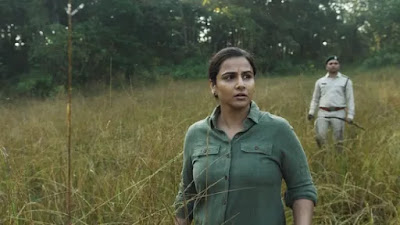No-one in Bollywood has had a more beneficial lockdown than Vidya Balan. Last year, the actress premiered the old-school star vehicle Shakuntala Devi, in which her eponymous mathematician was seen imposing her logic on late 20th century India through sheer force of will. Follow-up project Sherni, from Newton director Amit Masurkar, provides a marked contrast, in that Balan's playing a character who struggles to make her presence felt, at some personal and human cost. The Hindi mainstream's latest riff on the woman-in-a-man's-world theme - written by Aastha Tiku, with dialogue by Masurkar and Yashasvi Mishra - Sherni unfolds against the backdrop of a nature reserve where a very hungry tiger is on the loose. Balan's Vidya Vincent technically occupies a position of power, her wealth of on-the-job conservation experience having landed her the role of general manager in the forestry division overseeing the reserve. Yet her authority will be undermined at almost every turn, whether by underlings with residual loyalties to her predecessor, a blustering superior who serves as the physical embodiment of systemic failure, or an opportunistic hunter who's roared into town with eyes set on bagging himself a big cat. Geographically distanced from her loved ones, and caught amidst a minefield of competing interests, this quiet, dutiful professional soon finds herself pushed into the background, her voice of reason shouted down or drowned out. Obliged to hand over the microphone to a passing politico's mob at a safety demonstration she's arranged for local children, she's the very image of that rationality certain leaders have sidelined in favour of amplifying the rabble. I watched the film on the night the British PM Boris Johnson announced his response to rising numbers of new Covid infections was to abandon all remaining restrictions; there was some hard relating going on, to say the least.
That should give some indication on how Masurkar has fine-tuned this narrative to operate on two levels simultaneously. For starters, it's procedural, trooping along in the tracks of Vidya's department as they brief farmers, run recon for pawprints, and then set the cameras and traps that help neutralise apex predators. A lot of research has clearly gone into this aspect: sidebars ensue on the tensions between conservationists and hunters, and between nature reserves and the wider India. Yet Masurkar also opens this story up to a slightly more metaphorical reading: he's alighted here because this tiger's tale has something to tell us about crisis management at a time when those we've appointed to public office appear wholly incapable of formulating the right response. "What's your plan?," Vidya asks the hunter Pintu (Sharat Saxena), after he muscles onto her scene. "I never plan," comes the blunt reply. Inevitably, once out in the field, he muddles up tiger and leopard droppings, setting back the patrol's mission by several hours; he literally doesn't know his shit, which makes him another liability as the film's bodycount steadily, unsensationally mounts. As far as I could discern, Sherni was written and filmed before the pandemic, so we can't really claim it as a comment on leadership in the age of Covid; it's just that, for viewers in India and the UK in particular, the events of the past year and a half will have done much to bring the film's underlying themes into sharper focus.
Dramatically, however, Sherni starts to feel a little diffuse the longer it goes on. Masurkar mounts one memorable setpiece - a pursuit through the backrooms and corridors of the forestry division's offices that brings the outside inside - and he's hyper-alert to revealing turns of character, setting Vidya's superior Bansal (Brijendra Kala) to snacking in the back of a jeep as his team get on with the life-or-death legwork. Yet I felt some of these snapshots, those scenes that serve as a research delivery system, and the brief windows into Vidya's domestic life sometimes came between the film and the hunt at its centre; put simply, it's never quite as thrilling as a movie about a man-eating tigress probably should be. Sherni would make an interesting, instructive double-bill with Jallikattu, India's (somewhat contentious) selection for Academy Award consideration this year, a film that swapped in a runaway buffalo for the tiger, and sped to its own conclusion about the deleterious effects of mob rule. Jallikattu was unafraid of rabble-rousing, the better to shake its audience out of any complacency: that film blurred not just its images, but also the lines its characters were drawn in, to tremendously cinematic effect. Masurkar's filmmaking leans instead towards the classical and clear-cut. He makes Vidya an unimpeachable heroine - and Balan succeeds in courting our sympathies - but she might have proved an even more compelling heroine if she'd been allowed to finish the unfinished relationship business she seems to have with an old colleague (Neeraj Kabi). It's the difference between a fully-felt quandary and a problem that just needs solving; between a film we experience, as you do experience Jallikattu, and one where you spend two hours nodding appreciably at well-made points, choice framings or turns of phrase. That polite detachment, another bond of empathy between director and heroine, is hardly unhealthy or unhelpful, though, and indeed it may finally be the deciding factor in Sherni's broadly successful marriage of form and message: in these situations, Masurkar ventures, it pays to keep at least one cool, calm head around.
Sherni is now streaming via Prime Video.

No comments:
Post a Comment